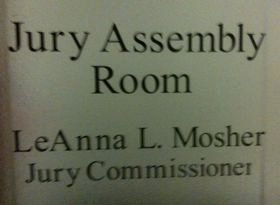I reported for jury duty today at 8:30 a.m., but my number, 1055, was not called until the very last courtroom’s call for jurors, just before noon. Twenty-four of us followed the clerk to Courtroom 100K, where a 16-year-old girl sat at a table with her mother and an attorney, a young woman who was leaning toward the girl and talking to her. Facing the judge were two young men in dark suits who both looked as if they spend a lot of time lifting weights; they were from the District Attorney’s office. Judge Raymond N. Satter looked like Wilford Brimley, with a handsome full mustache and a courteous, friendly manner with the potential jurors. I kept questioning myself, to determine if there was anything about this case that would render me incapable of being a fair and impartial juror. The judge kept probing, too. It reminded me of that breath-holding point in a traditional wedding when the minister asks, “If any of you has reasons why these two should not be married, speak now or forever hold your peace.” I held my peace. I decided that yes, I could give a fair hearing to the People’s assertion that one night in August of last year the defendant drove a pickup truck recklessly without a license while intoxicated and did not give the right of way to an emergency vehicle.
It took an hour to winnow the twenty-four down to six jurors. Judge Satter asked us questions, as did the attorneys. We each gave a quick life summary, following a printed sheet – age, how long a resident of Denver, family, occupation, hobbies, and favorite television shows. I said I don’t watch TV. We were a varied lot, from high school-only graduates to Ph.Ds. I thought we were an impressive group, representing many kinds of work, education, life experience, and accents. One man asked to be excused, because his English was not good enough, and the judge granted his request. None of the attorneys asked me a direct question, and I did not volunteer any answers to the general questions. When the questioning was over, the judge conferred with the attorneys. He then dismissed the half of us that was not sitting in the jurors’ box. He then read the names of six of us who were excused from duty. My name was not one of them.
We broke at that point for lunch, wearing our bright “Juror” stickers, with instructions not to speak with anyone in the Courthouse and not to TXT, Twitter, or talk to anyone about the case. I called Darlene to tell her I was on a jury and did not expect to be home until after 7 p.m. By the time I reached the basement cafeteria, I was very hungry, so I ordered a BLT, a cup of red chili, chips, an Almond Joy, and a Dr. Pepper. I ate by myself, reading from a short story collection by Seth Harwood on my Kindle. On my way back to the first-floor jury room, I got lost briefly in the bowels of the courthouse basement, missing the door to the stairway.
Back in the courtroom, we heard opening arguments from both sides, and a stocky young policeman took the stand to describe the events of the night in question. He wore a white shirt, dark blue tie and black suit, and he seemed nervous as one of the prosecutors walked him through his testimony. Based on the opening arguments, we had learned that the key issue was going to be whether the defendant had really been driving the truck, or had her older cousin, who had been in trouble with the law already, switched places with her as the policeman approached the vehicle after stopping it. He stated that he shined a flashlight at the side-view mirror and saw the defendant in the driver’s seat during the four to 10 seconds it took to reach the car, and that no one switched places. But when he mentioned that one of the other officers responding to the scene had been told by someone else in the truck that they had switched places with the defendant, the girls’ lawyer objected, and everything stopped.
The three attorneys approached the bench, and I was sitting close enough to be pretty sure I heard the word “mistrial” mentioned. We were asked to leave the courtroom, and when we came back the judge said the case had been removed from our consideration. In the hallway afterward, the three attorneys explained that the policeman had testified to something which had not been revealed to the defense beforehand. Rather than do the case all over again, the prosecutors offered a lesser charge, which was accepted.
I suppose I was relieved to head home early. But in the three extra hours here, I have not been able to resume my scheduled work. There was something quite unsettling about my day in court.
To begin with, there was the age of the defendant, and beyond that, her tiny size. She could have been 14 years old, not 16. She comported herself appropriately, but a couple of times during the officer’s testimony she smiled in a way that, to me, verged on a smirk. The officer said he had to jump up on a car he had stopped on I-70 when the defendant’s truck careened toward him at high speed, narrowly missing him, leading to the eventual arrest. There were six kids in the pickup, all underage and all intoxicated. It wasn’t a good scene. Apparently, no one got hurt. The defendant’s attorney was sharp and seemed to have the upper hand over the guys from the DA’s office. Or maybe they simply got blindsided by the officer’s stray comment. At the time we were dismissed, I had not heard enough to believe anything about this incident beyond a reasonable doubt.
I also never got a chance to discuss the case with the five other jurors, who seemed an intriguing lot — two women and three men. I was very ready to be a juror, to turn my iPhone all the way off and to pay attention to every word said in that high-ceilinged old courtroom with the rocking wooden jurors’ chairs installed in the 1930s. I had decided to take few notes, because sometimes I hide behind note-taking and distract myself from what’s being said. I was eager to do my best to understand this case and to help reach a fair verdict.
I suspect that jurors who have the chance to deliberate and come to unanimous decisions sometimes feel unsettled by their experiences, because how can you ever know for sure? And I’m still impressed by the jury system that I was a part of today. The judge and everyone involved acted as if what was going on mattered, and not just the outcome to the defendant, but the dignity and quality of the process itself.
I heard enough in Courtroom 100K to know that things nearly went terribly wrong that August night. I have no idea what sort of settlement was offered and accepted. I don’t know if that 16-year-old girl learned anything today that will protect her, and others, from tragedy down the road. That is perhaps what has unsettled me the most.
 Send to Kindle
Send to Kindle


For some people, punishment has nothing to do with motivation. If you don’t buy into the system you’re a part of, you have no reason to play by their rules, penalties or not. And the justifiably cynical society we are today doesn’t offer much in the way of incentive.
Nice recap, by the way. It borders on obsessively detailed, but it paints a vivid picture of your experience. Much appreciated.